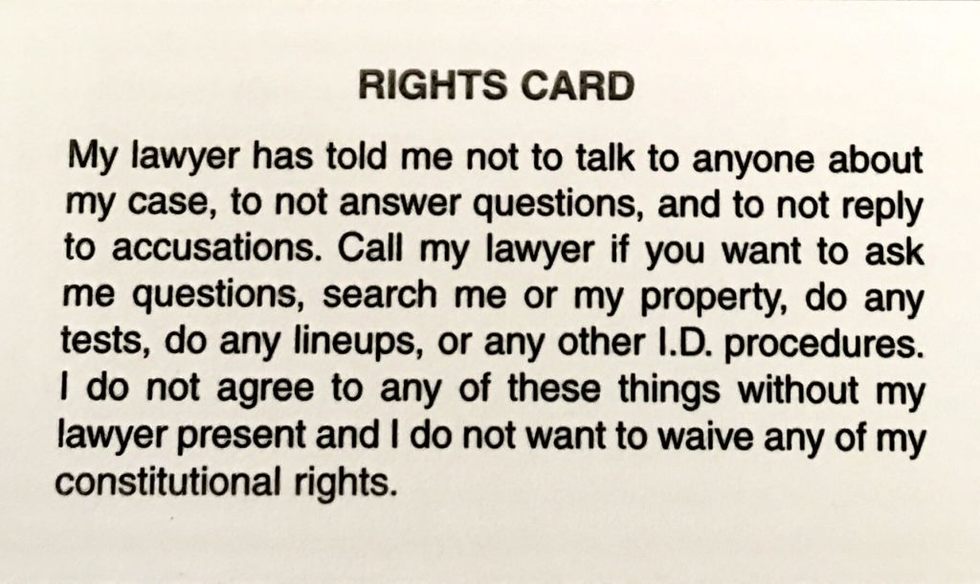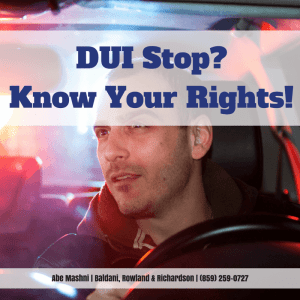As a criminal defense attorney, one of the most popular questions I get is, “What should I do if I get pulled over for a DUI?” My answer is simple – “Don’t drink and drive.” But sometimes, for some strange reason, people don’t listen to my advice. Or they call me after the DUI traffic stop and by that time, it’s too late. It’s important to know your rights in these critical moments. That’s why the “Rights Card” below is on the back of all of my business cards. So here are some things you should consider if you ever find yourself in that predicament.
When an officer pulls you over to conduct a traffic stop, the officer must have a reasonable and articulable suspicion that a crime has been committed.
Let’s break it down: First, it only has to be a reasonable suspicion. This is a lower standard than “probable cause”. Second, the officer must be able to articulate or explain that suspicion. Third, the officer can suspect ANY crime – even very minor traffic violations. This prompted Warren Buffett to state in a 2013 interview, “If a cop follows you for 500 miles, you’re going to get a ticket.” Here is a list of traffic violations recognized in Kentucky.

Once an officer initiates the traffic stop, you can help ease tensions by keeping your hands on the steering wheel where the officer can clearly see them. If you have a firearm in the vehicle, immediately notify the officer and advise where in the vehicle it is located. During your interaction with the officer, it helps to be respectful and polite. If asked, you are required to provide the officer with your driver’s license, vehicle registration, and car insurance information.
During the traffic stop, the police officer will be looking for evidence of crimes. This is the police officer’s job and it is something they are specifically trained to do. If the officer suspects further criminal activity (DUI, possession of drugs, trafficking drugs, etc.), the officer will usually attempt to engage in a conversation with you. Although the questioning might begin innocent and friendly, the intent will always be to gather more information and possible evidence of a crime. Bottom Line: The more information you give to the officer; the more evidence you are providing that will be used against you.
With that said, DO NOT, UNDER ANY CIRCUMSTANCE, answer any of the following questions:
- How much sleep you’ve had
- How much food you’ve eaten
- How many drinks you’ve had
- Where you are coming from
- Where you are going
If the officer suspects you are DUI, the officer will ask that you exit the vehicle. You are required to comply with this request. Next, the officer might ask for your consent to blow into a roadside preliminary breath test (PBT). ALWAYS REFUSE THE PBT. The PBT is not admissible at trial due to errors and inconsistent results. If you blow into the roadside PBT and the results detect alcohol on your breath, you are simply giving the officer more probable cause to arrest you.
Next, the officer might ask you to perform standard field sobriety tests (SFTs). At this point the officer has usually made up his/her mind to arrest you based on what they have observed, heard, and smelled. The three tests are: (1) Horizontal Gaze Nystagmus (commonly referred to as the eye test); (2) One-Leg Stand; and (3) Walk and Turn. During each of these tests the officer looks for “cues” that the subject is impaired. These subtle cues can easily be misinterpreted or wrongfully detected if the officer does not administer the test properly or is inexperienced. Because the tests are purely subjective and the officer is going into the tests with a preconceived notion you are under the influence, you have a very little chance of helping your situation by taking a SFT. In most cases, a polite refusal “until I speak with an attorney” may be the best option.
You might be thinking – if you refuse to answer the officer’s questions, refuse consent to search the vehicle, refuse to submit to a PBT, and refuse to participate in the SFTs then the officer is going to think you have something to hide. This is definitely true. However, there’s a reason the officer pulled you over, began to question you, asked you to exit the vehicle, and asked you to submit to a PBT and SFTs. The officer already suspected you of DUI and by employing these investigative tactics, the officer was seeking more evidence to support his/her suspicion.
Getting pulled over for DUI can be a very stressful situation with implications ranging from jail time, loss of a job, license suspension, alcohol education classes, and costly fines and fees. If you or a friend/family member have been charged with DUI in Kentucky, or have any questions about this post, please contact me or give me a call at (859) 259-0727
